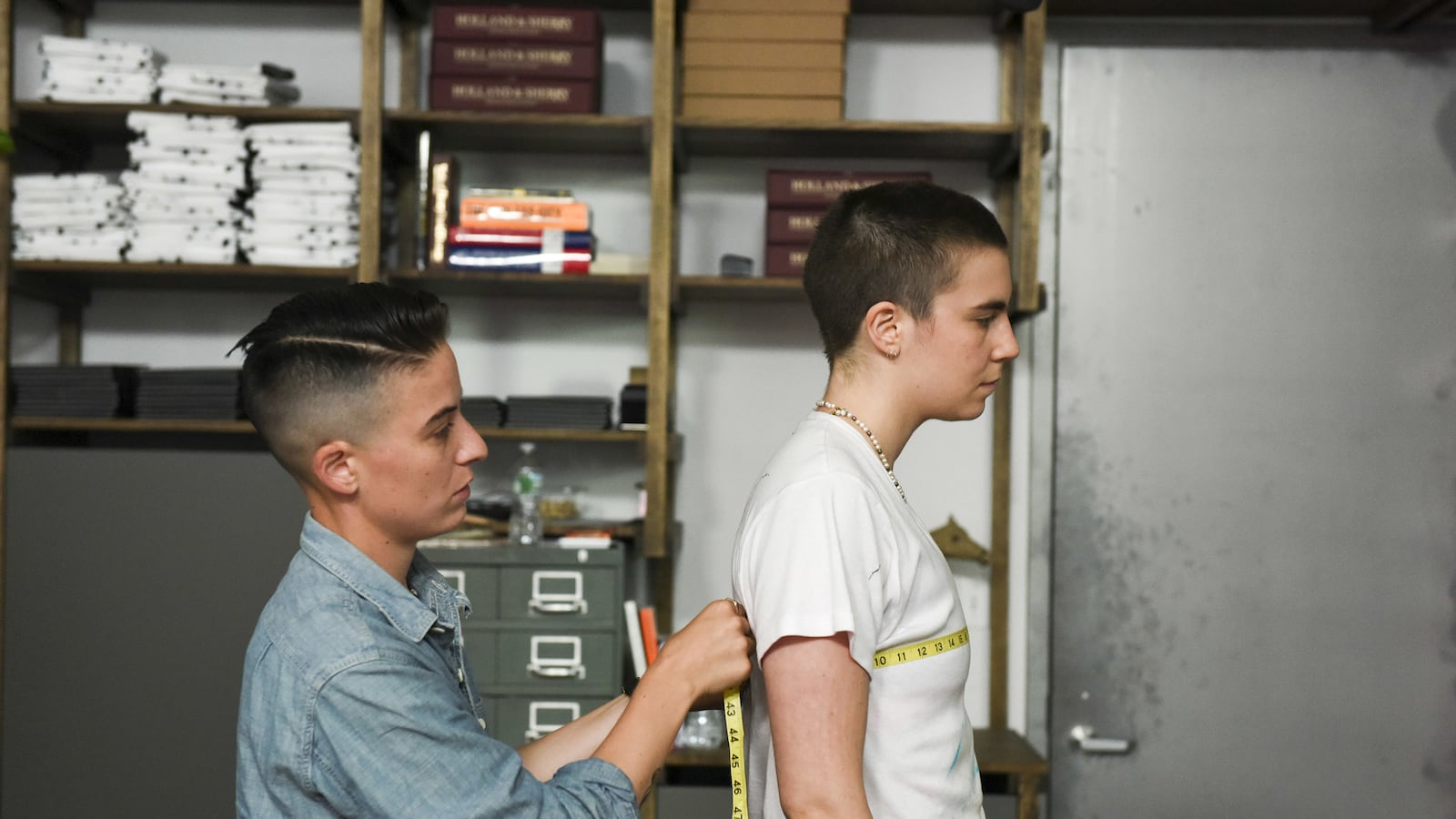At the end of the documentary Suited, Everett Arthur, a transgender law student from Georgia, examines himself in the mirror, checking out the fit of his new suit. He looks thoughtful and a little hesitant at first, and it’s hard to tell exactly what he’s feeling, and if he likes his new look. Then he starts to tear up.
“It’s hard to stand here and look at myself in the mirror when I’ve never really liked what I’ve seen,” he says. Then a few beats later, “Really good. I really appreciate it. Customer for life,” he laughs.
Arthur is a client of Bindle & Keep, a Brooklyn-based tailoring company that has somewhat unconsciously become the clothier to the transgender community and is now the subject of a new documentary premiering Monday night on HBO.
Most people don’t have to think twice about heading to the mall to find a new outfit for a special occasion or something that will make them feel comfortable and confidant.
But, for many who identify as transgender or gender non-conforming, buying the perfect off-the-rack ensemble—one that not only fits like a dream but also presents them to the world the way they want to be seen—is an elusive prospect at best.
Rae Tutera knows something about this. In 2010, Tutera was fed up with the experience of shopping in stores that “made me feel like a misfit in many different ways, with my body and my gender,” Tutera tells The Daily Beast. So, Tutera decided to indulge in a custom-made suit from a tailor that had been recommended by a cis friend.
“I got something imperfect from it, but it made such an impact on me…I just never felt so good about myself before,” Tutera says on screen.
It was a first for both Tutera and the tailor, but it was a transformative experience, one that Tutera wanted to spread to others in their community. So, Tutera approached Daniel Friedman, the owner of Bindle & Keep, asking for an apprenticeship to learn the art of tailoring.
“He was openminded,” Tutera says of Friedman. “I could tell that he didn’t know what to make of my gender, didn’t know what to make of my feeling that there was this whole other world of people to put clothes on.”
Now, several years later, Friedman reports proudly onscreen that the majority of Bindle & Keep’s suits are made for members of the LGBTQ community. “Rae has changed my life. There’s no question that if I did not meet Rae, my life would be less meaningful,” Friedman says.
When new clients enter Bindle & Keep’s studio, they not only pose for a flurry of measurements, go through fabric swatches, and answer questions about the style of suit they want. They also get into more personal territory.

Measurements aside, what do they like and dislike about their bodies? Bindle & Keep can make a perfectly fitted suit, but also one that de-emphasizes hips or bust.
Or, as one client Derek Matteson requests for his wedding, “I really don’t want anyone to be able to pick me out from a line of guys and be like, there’s curves on this body that don’t make sense.”
“It’s all about just feeling great in your body, especially when people have been struggling their entire lives and they finally get into something that really fits them, that really fits them the way they’ve always envisioned something would fit them. That’s not fashion anymore and that’s what we’re after,” Friedman says in the film.
Suited spotlights six clients from a range of backgrounds who are all searching for a suit that will make them feel comfortable and special in their bodies.
Among them are law student Arthur, who needs a suit that will help him push past the discrimination he’s facing in job interviews, 12-year-old Aidan Star Jones who is making his Bar Mitzvah and coming out to his community, and Dr. Jillian T. Weiss, a transgender woman who needs a fierce suit to wear while arguing a high-powered case in court for transgender rights.
There is vulnerability and bravery as they tell their stories to their tailors—and now the world. But the real moment is the one that finds each of the clients standing in front of the mirror in clothes that actually fit, seeing themselves quite possibly for the first time.
It was that moment that inspired director Jason Benjamin, who is making his directorial debut with Suited, to take on this project. Benjamin was working as a boom operator on the set of the HBO series Girls when he read a New York Times article about Bindle & Keep.
“I sort of came at it with no exposure or information about the trans community,” Benjamin tells The Daily Beast. “But as I read about the moment, that moment was a moment about people and something that I [thought] would be beautiful to watch. So I sort of carried that image around with me for a few days.”
But he found that it was a lot more complicated once he actually was in the room when it happened. After Girls co-creators Lena Dunham and Jenni Konner (who are also producers on Suited) encouraged him to explore making a documentary, he found himself in Bindle & Keep’s studio filming as clients’ saw themselves in their new threads.
“When I initially read about that moment, I thought it would be a happy moment. I realized in the course of making the film and seeing a few people go through this that it’s more than happy. There’s a lot of nuance going into that moment,” Benjamin says.
The stakes are high and are about much more than just fashion. Clothes have the power to transform people both in their own eyes and that of the world. It is a magical moment that is vulnerable and scary and exciting—and potentially transformative.
It was this range of emotions that played out across Arthur’s face when he looked at himself in his new interview suit for the first time.
“I feel like a suit is really just a gateway for most folks to sort of think about themselves, think about how they treat themselves, how they present themselves to the world,” Tutera says. “I think it’s a hard process for people to integrate their real selves into the world, and the suit is supposed to bring you to that next place. And then you can take the suit off and hopefully just continue to present yourself and make eye contact with people, make eye contact with yourself.”
As the publicity and excitement mounts around the film, Tutera is still processing the experience.
The documentary was screened at Sundance in January, where Tutera and many of the movie’s subjects saw it for the first time (“who would expect us to ever be in Utah, at all, really, but for Sundance to see a movie that you’re in that’s edited and color corrected and with parts of your story contextualized in a way that you have no control over?”). And Tutera’s family saw it for the first time the week before the HBO premiere.
While Tutera was hesitant when Benjamin first approached with the idea for the project, Tutera calls the result “extremely tender.”
“I feel sort of like I’m born again in some weird way, and I want to spread the gospel of wearing things that fit and make you feel OK being seen by people even people who don’t understand you or respect you,” Tutera says at the end of Suited. “Everyone has a right to feel good and be themselves. You have a right to be handsome.”






